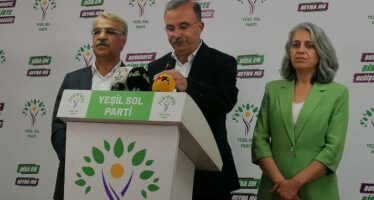Öcalan’s rationality
![]()
Lale Kemal
There are fears that violence may resume next month, mainly in the predominantly Kurdish, war-stricken southeastern parts of Turkey, if the Kurdistan Workers’ Party (PKK) terrorist organization fails to abide by its self-declared cease-fire, in effect until the June general elections.
At this point, whether Abdullah Öcalan, the imprisoned leader of the PKK, will act in a rational manner gains importance. The PKK is designated by both the US and the European Union as a terrorist organization, while it is outlawed by Turkey. Starting its armed struggle to create an independent Kurdish state in southeastern Turkey almost 26 years ago, the PKK is now seeking wide-ranging autonomy instead. This change in policy comes at a time when Turkey has shifted its paradigm from one based solely on a military solution to the problem to one based on non-military means to resolve the conflict.
Öcalan, who is serving a life sentence at a prison in ?mral?, an island in the Sea of Marmara, has been among the PKK’s leading actors, in addition to Murat Karay?lan-led bases in the Kandil Mountains as well the Makhmour camp, both in nearby northern Iraq. But Öcalan has emerged as the final decision maker on matters such as declaring a cease-fire or resuming the armed struggle. It is also no longer a secret that state officials have been conducting talks with Öcalan to find peaceful means to solve the decades-old Kurdish question.
And it is also no secret that Öcalan has been seeking to reap some benefits to ease his conditions, such as being placed under house arrest instead as a bargaining chip just before the general elections, due to take place in around three-and-a-half months. He is, however, well aware that neither the ruling Justice and Development Party (AK Party) nor any other political party, except for the pro-Kurdish Peace and Democracy Party (BDP), will agree to house arrest or a general amnesty in the short or medium terms.
One senior government security expert recently told me that for Öcalan to be placed under house arrest, several conditions must be met, such as extending the cease-fire indefinitely and increasing the public’s awareness of the importance of solving the Kurdish question as well as changing the public mindset that has been associating the PKK with Kurds in general.
About 50,000 people, mostly security forces and PKK members as well as civilians, are estimated to have died as a result of the fight against the PKK.
The public has been conditioned to a state ideology that puts all the blame for the deaths and the fight on the PKK. It is only recently that we have realized that the military’s security flaws in the fight against the PKK should also be blamed for the prolongation of the war. The inability of political authorities over the decades to control the armed forces has stood as another weakness in the prolongation of the war, leading to a high number of deaths, misery and a huge loss in economic resources.
Öcalan, meanwhile, is also well aware that any orders to resume violence some time in March instead of abiding by the cease-fire the PKK declared will complicate election calculations — especially those of the ruling AK Party. The resumption of the armed struggle before the June elections will mean more deaths and lead to more anti-government votes at the ballot box.
The AK Party is strongly expected to win the elections, giving it a third term since the November 2002 elections that brought it to power. Analysts say the AK Party, with 334 deputies in Parliament at the moment, can guarantee 330 or more deputies in the next elections. But a resumption of violence would have a negative effect on the party, reducing its popularity.
There are expectations within the government that Öcalan will act in a rational manner and order his men not to resume acts of egregious violence in March, bearing in mind that if the AK Party wins the elections, he will find himself in a difficult position to have his request approved.
In the meantime, there are also scenarios under which other political parties, if they win the elections, may form a coalition government, sending the AK Party into the opposition. None of the political parties, except for the AK Party, expected to enter Parliament have thus far put forward any concrete programs concerning how they would further improve democratic standards. Their Kurdish policy is not only vague but far from finding a solution to this chronic problem. A coalition to be set up among those political parties under the system of military tutelage will not serve Öcalan’s interests, either.
Related Articles
Autopsy reveals councillor Ayhan was hit by bullet
![]()
Autopsy report says bullet and not tear gas caused death of councillor at peace demonstration According to the autopsy carried
HDP and Green Left Party: We made an effort to open the door to democracy
![]()
Peoples’ Democratic Party (HDP) co-chair Mithat Sancar and Green Left Party co-spokespersons Çiğdem Kılıçgün Uçar and İbrahim Akın held a press conference on the presidential run-off elections
KCK prolongs cease-fire until next year’s elections
![]()
?SMAIL AVCI DIYARBAKIRThe Kurdish Communities Union (KCK), the urban arm of the terrorist Kurdistan Workers’ Party (PKK), has announced that



